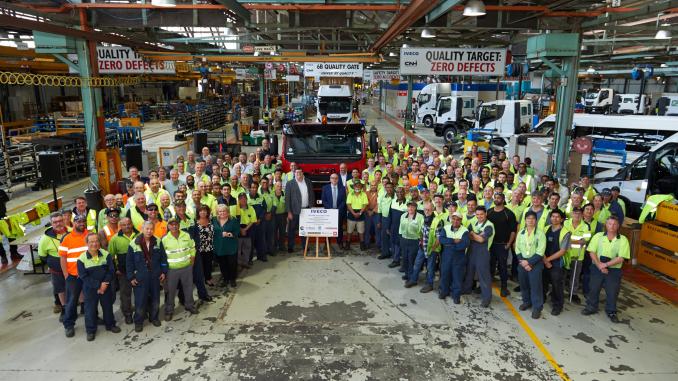
In what might be another nail in the coffin for Iveco’s local manufacturing operations the company has marked the completion of the last Euro 5 Acco from its Dandenong plant in Melbourne .
Its the last current generation Acco to be built at the factory since the first came down the ine with an International brand on it 58 years ago in 1961.
Initially developed from the International Mark 3 general service 4×4 Army truck and adapted for civilian use, the Acco’s simple design and tough underpinnings saw widespread acceptance of the model which has continued till now.
The current shape Acco was introduced in 1972 and has been further developed culminating in the introduction of the Euro 5 in 2014.
Iveco says that with ever increasing emission and safety requirements the current model has reached its full development potential and that it can’t be made to comply with Euro 6. Only problem there is, Euro 6 has not yet been mandated by the government for the Australia market, with no firm date for its introduction. From this we are to assume that Iveco has decided to kill off the local Acco, despite continuing strong demand in the waste and concrete sectors, with its clear price and weight advantages. The new Acco badged model to be based on the Stralis is not as competitive weight wise and is believed to be less competitve price wise.
The event to mark the completion of the last real Acco was attended by Iveco Australia staff and key component suppliers to the Acco range over the years including Alcoa Wheels, Cummins South Pacific, Dana Australia, Goodyear and Dunlop Tyres, Heavy Automatics, Hendrickson Asia Pacific, Hilton Manufacturing and Meritor HVS, all of whom received commemorative plaques.
Iveco Australia and New Zealand managing director, Bruce Healy, and Iveco brand ambassador Lloyd Reeman, who has been involved with the Acco since the 1970s, spoke of the Acco’s proud heritage and also advised that the last unit built will be retained by Iveco for posterity and for display.
Its no doubt a piece of Australian automotive history and the passing of a real legend of road transport. It is unlikely we will see a vehicle achieve such a remarkable production run over almost six decades ever again.



